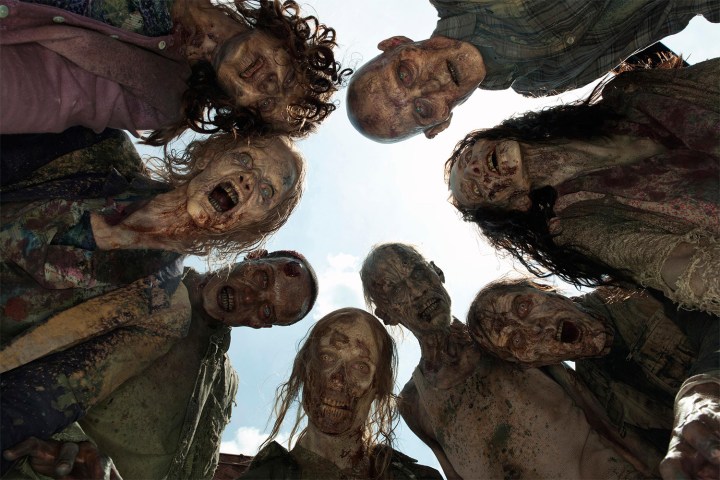
Our collective fears mirror our media. Back when the media were mass, so was our world’s threatened end: Hydrogen bombs would rain upon us and we’d all go together when we go, as Tom Lehrer used to sing. You can’t get much more “top down” than a nuclear holocaust delivered by intercontinental missiles.
But now we have the Internet, so our nightmares are bottom up and peer-to-peer: the zombie apocalypse, the killer virus apocalypse, or the two of them together. But even if we never meet an army of lumbering undead in real life, society’s fascination with a viral apocalypse can teach us a lot about how we use – and abuse – the Internet.
The nightmare Net
Viruses and zombies propagate the way the Internet does: person to person, fanning out until they reach millions. The Internet was initially created to enable researchers to share good information, so naturally, the apocalyptic version of it shares wrong, harmful information. It plays into our temptation to propagate powerfully bad ideas to every other brain within shouting distance. Except now, billions of brains are within shouting distance. Or biting distance.
The Internet’s weakness is perfectly capable of co-existing with its greatest strengths.
This is the nightmare version of the Net. The dream of the Internet (and also its dominant realization) is to enable people to connect with one another to become more fully human. In our nightmares, dehumanization spreads through a dehumanized engagement— a sneeze, the grasping of a public handrail, the chomp of a zombie.
Our dominant systems have always given us our dominant fears. For early Christians, the dream was to be possessed by the spirit of Jesus, and the nightmare was to be possessed by Satan. For the Cold War the dream was a balance of power — of madness — and the fear was an unbalanced flight of missiles. For the Internet, the dream is peer-to-peer engagement, so the nightmare is peer-to-peer infection. Systemic weaknesses give rise to pervasive, recurrent fears.
But there is a difference. The Cold War couldn’t proceed if its systemic weaknesses were exploited, because civilization would be reduced to rubble. But the Internet shambles forward relentlessly even as its weakness is systematically exploited. There are viruses of all sorts all over the Net, and yet the Net thrives.
Living with infection
Many of the Net’s viral infections are healthy: memes, political ideas spread via hashtags, clever and even inspiring videos. But some of the viral manifestations are malignant. Botnets take over computers that then further spread botnets. Nude photos from hacked phones propagate like STDs. Crowds of online bullies chase people to their real-world homes. Most recently, Microsoft’s Tay twitterbot got successfully trolled and turned into foul-mouthed, women-hating, racist, anti-semitic Nazi in 24 hours. The Internet’s weakness is perfectly capable of co-existing with its greatest strengths.
But we should take some hope from the prevalence of these infections, because they acknowledge how profoundly the Internet is challenging our old institutions. We had grown accustomed to top-down power structures. The more important the decision, the less likely that it was in our hands. We watched what Big Media showed us, read what they published, and listened to what they played for us. The thought that our own work could be passed around, hand to hand, link to link, until the entire world could read it, see it, or hear it … that was not a sensible thought. Until the Internet.
We love our new freedom — how else to explain the explosion of creativity the Net has engendered? But we also fear it. So we imagine the worst possible outcomes of our new peer-to-peer medium: deadly viruses and zombies. Zombies are the new stage before Acceptance in Kübler-Ross’s chart of grief.
Perhaps we will soon come to grips with the momentous fact that we are changing the world person to person, mostly, for the better because unlike viruses and the undead, we have functioning brains and hearts, and intelligence and empathy are more viral than any meme.
 David Weinberger writes about the effect of technology on ideas. He is the author of Small Pieces Loosely Joined and Everything Is Miscellaneous, and is the co-author of The Cluetrain Manifesto. His most recent book, Too Big to Know, about the Internet’s effect on how and what we know. David Weinberger writes about the effect of technology on ideas. He is the author of Small Pieces Loosely Joined and Everything Is Miscellaneous, and is the co-author of The Cluetrain Manifesto. His most recent book, Too Big to Know, about the Internet’s effect on how and what we know.
Dr. Weinberger is a senior researcher at the Berkman Center. He has been a philosophy professor, journalist, strategic marketing consultant to high tech companies, Internet entrepreneur, advisor to several presidential campaigns, and a Franklin Fellow at the US State Department. He was for four years the co-director of the Harvard Library Innovation Lab, focusing on the future of libraries. |


